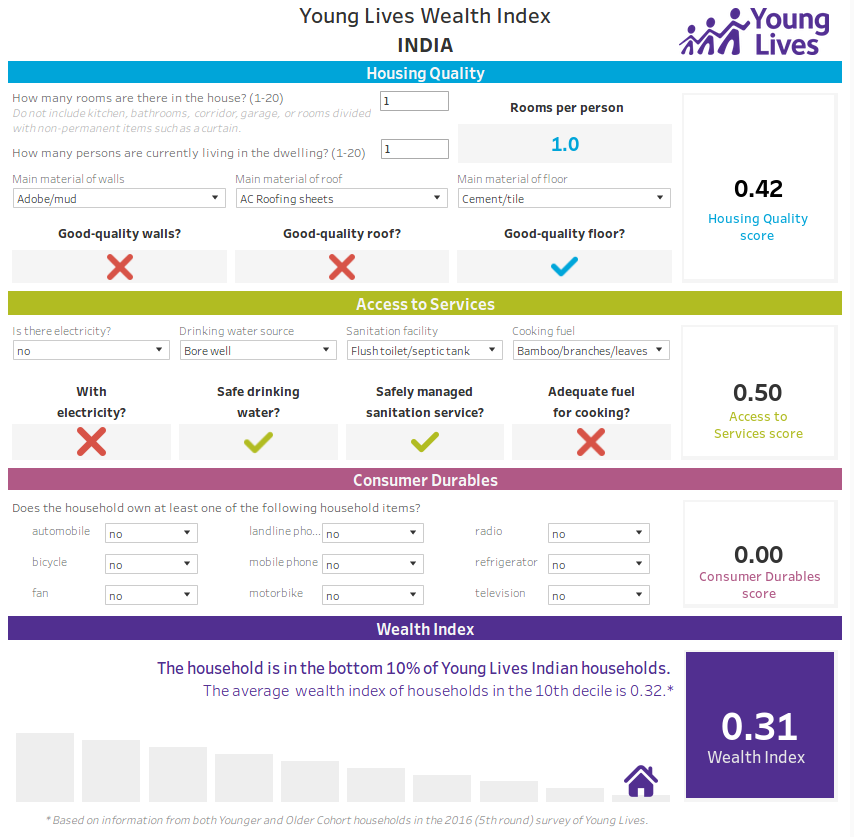
Data from the Young Lives school survey in Vietnam are now available to download and use from the UK Data Archive.
The survey included data collection at the school, class and pupil level, and involved the Principal, the teacher of Grade 5 class, and pupil. The instruments included in the survey are:
- Principal questionnaire. Administered individually by fieldworkers to principals.
- School site observation. Fieldworker completed through observation of school site during their time in the school.
- Teacher questionnaire. Administered individually by fieldworkers to teacher of YL child's class.
- Pupil questionnaire. Administered to the whole class. Fieldworker led and directed. Collected background data on the Pupil, as well as information on attitudes to school.
- Pupil assessments in Maths and Vietnamese. Administered to the whole class. Fieldworker led and directed.
The school survey was introduced into Young Lives in 2010, following the third round of the household survey, in order to capture detailed information about children's experiences of schooling. It addressed two main research questions:
- how do the relationships between poverty and child development manifest themselves and impact upon children's educational experiences and outcomes?
- to what extent does children's experience of school reinforce or compensate for disadvantage in terms of child development and poverty?
The survey allows researchers to link longitudinal information on household and child characteristics from the household survey with data on the schools attended by the Young Lives children and children's achievements inside and outside the school. A wide range of stakeholders, including government representatives at national and sub-national levels, NGOs and donor organisations were involved in the design of the school survey, so the researchers could be sure that the 'right questions' were being asked to address major policy concerns. This consultation process means that policymakers already understand the context and potential of the Young Lives research and are interested to utilise the data and analysis to inform their policy decisions. The survey provides policy-relevant information on the relationship between child development (and its determinants) and children's experience of school, including access, quality and progression. This combination of household, child and school-level data over time constitutes the comparative advantage of the Young Lives study.
School Survey data are now available from the UK Data Archive for India (SN 7478), Peru (SN 7479) and Vietnam (SN 7633).
Further information is available from the Young Lives School Survey webpages.
A full report and summary of the Vietnam school survey are available here:
Making Progress: Report of the Young Lives School Survey in Vietnam, by Caine Rolleston, Zoe James, Laure Pasquier-Doumer and Tran Ngo Thi Minh Tam (Young Lives Working Paper 100, August 2013)
Making Progress: Summary of the Young Lives School Survey in Vietnam, by Caine Rolleston, Zoe James, Laure Pasquier-Dourner, Tran Ngo Thi Minh Tam and Le Thuc Duc, June 2013


Data from the Young Lives school survey in Vietnam are now available to download and use from the UK Data Archive.
The survey included data collection at the school, class and pupil level, and involved the Principal, the teacher of Grade 5 class, and pupil. The instruments included in the survey are:
- Principal questionnaire. Administered individually by fieldworkers to principals.
- School site observation. Fieldworker completed through observation of school site during their time in the school.
- Teacher questionnaire. Administered individually by fieldworkers to teacher of YL child's class.
- Pupil questionnaire. Administered to the whole class. Fieldworker led and directed. Collected background data on the Pupil, as well as information on attitudes to school.
- Pupil assessments in Maths and Vietnamese. Administered to the whole class. Fieldworker led and directed.
The school survey was introduced into Young Lives in 2010, following the third round of the household survey, in order to capture detailed information about children's experiences of schooling. It addressed two main research questions:
- how do the relationships between poverty and child development manifest themselves and impact upon children's educational experiences and outcomes?
- to what extent does children's experience of school reinforce or compensate for disadvantage in terms of child development and poverty?
The survey allows researchers to link longitudinal information on household and child characteristics from the household survey with data on the schools attended by the Young Lives children and children's achievements inside and outside the school. A wide range of stakeholders, including government representatives at national and sub-national levels, NGOs and donor organisations were involved in the design of the school survey, so the researchers could be sure that the 'right questions' were being asked to address major policy concerns. This consultation process means that policymakers already understand the context and potential of the Young Lives research and are interested to utilise the data and analysis to inform their policy decisions. The survey provides policy-relevant information on the relationship between child development (and its determinants) and children's experience of school, including access, quality and progression. This combination of household, child and school-level data over time constitutes the comparative advantage of the Young Lives study.
School Survey data are now available from the UK Data Archive for India (SN 7478), Peru (SN 7479) and Vietnam (SN 7633).
Further information is available from the Young Lives School Survey webpages.
A full report and summary of the Vietnam school survey are available here:
Making Progress: Report of the Young Lives School Survey in Vietnam, by Caine Rolleston, Zoe James, Laure Pasquier-Doumer and Tran Ngo Thi Minh Tam (Young Lives Working Paper 100, August 2013)
Making Progress: Summary of the Young Lives School Survey in Vietnam, by Caine Rolleston, Zoe James, Laure Pasquier-Dourner, Tran Ngo Thi Minh Tam and Le Thuc Duc, June 2013


